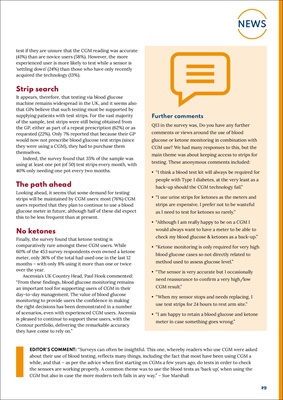
19
NEWS
test if they are unsure that the CGM reading was accurate
(41%) than are novice users (58%). However, the more
experienced user is more likely to test while a sensor is
'settling down' (24%) than those who have only recently
acquired the technology (13%).
Strip search
It appears, therefore, that testing via blood glucose
machine remains widespread in the UK, and it seems also
that GPs believe that such testing must be supported by
supplying patients with test strips. For the vast majority
of the sample, test strips were still being obtained from
the GP, either as part of a repeat prescription (62%) or as
requested (22%). Only 7% reported that because their GP
would now not prescribe blood glucose test strips (since
they were using a CGM), they had to purchase them
themselves.
Indeed, the survey found that 35% of the sample was
using at least one pot (of 50) test strips every month, with
40% only needing one pot every two months.
The path ahead
Looking ahead, it seems that some demand for testing
strips will be maintained by CGM users: most (76%) CGM
users reported that they plan to continue to use a blood
glucose meter in future, although half of these did expect
this to be less frequent than at present.
No ketones
Finally, the survey found that ketone testing is
comparatively rare amongst these CGM users. While
60% of the 453 survey respondents even owned a ketone
meter, only 36% of the total had used one in the last 12
months - with only 8% using it more than one or twice
over the year.
Ascensia's UK Country Head, Paul Hook commented:
"From these findings, blood glucose monitoring remains
an important tool for supporting users of CGM in their
day-to-day management. The value of blood glucose
monitoring to provide users the confidence in making
the right decisions has been demonstrated in a number
of scenarios, even with experienced CGM users. Ascensia
is pleased to continue to support these users, with the
Contour portfolio, delivering the remarkable accuracy
they have come to rely on."
Further comments
Q13 in the survey was, Do you have any further
comments or views around the use of blood
glucose or ketone monitoring in combination with
CGM use? We had many responses to this, but the
main theme was about keeping access to strips for
testing. These anonymous comments included:
• "I think a blood test kit will always be required for
people with Type 1 diabetes, at the very least as a
back-up should the CGM technology fail."
• "I use urine strips for ketones as the meters and
strips are expensive. I prefer not to be wasteful
as I need to test for ketones so rarely."
• "Although I am really happy to be on a CGM I
would always want to have a meter to be able to
check my blood glucose & ketones as a back-up."
• "Ketone monitoring is only required for very high
blood glucose cases so not directly related to
method used to assess glucose level."
• "The sensor is very accurate but I occasionally
need reassurance to confirm a very high/low
CGM result."
• "When my sensor stops and needs replacing, I
use test strips for 24 hours to rest arm site."
• "I am happy to retain a blood glucose and ketone
meter in case something goes wrong."
EDITOR'S COMMENT: "Surveys can often be insightful. This one, whereby readers who use CGM were asked
about their use of blood testing, reflects many things, including the fact that most have been using CGM a
while, and that - as per the advice when first starting on CGMs a few years ago, do tests in order to check
the sensors are working properly. A common theme was to use the blood tests as 'back up', when using the
CGM but also in case the more modern tech fails in any way." - Sue Marshall